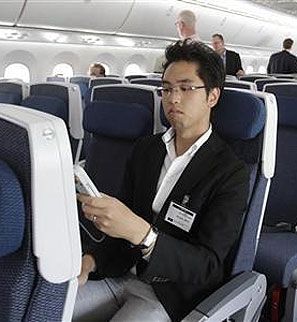 | « Back to article | Print this article |
The civil aviation ministry is preparing to revise India’s bilateral seat entitlements to Dubai and increase those by 20 per cent.
 The move, however, is likely to trigger a battle for a larger share of the lucrative India-West Asia to US and Europe market among leading West Asian carriers like Emirates, Qatar Airlines and Etihad-Jet alliance. Between 50 per cent and 75 per cent of Indian travellers to West Asia are transit passengers to the US, Europe and Africa.
The move, however, is likely to trigger a battle for a larger share of the lucrative India-West Asia to US and Europe market among leading West Asian carriers like Emirates, Qatar Airlines and Etihad-Jet alliance. Between 50 per cent and 75 per cent of Indian travellers to West Asia are transit passengers to the US, Europe and Africa.
An inter-ministerial group, comprising representatives of the civil aviation ministry and other government departments, is to meet in New Delhi in a few days to consider Dubai’s demand for an additional 20,000 seats per week. Two years ago, the hub’s present entitlement of 54,200 seats had been exhausted by Emirates and low-cost carrier flydubai.
Confirming the development, a ministry official said: “Dubai has exhausted its seat entitlements to India, while Indian carriers still have some unutilised capacity. We are looking at a revision in bilaterals with Dubai, given the potential demand in the sector over the next two-three years. We are considering giving them a 20 per cent increase (10,800 seats).”
According to many competing airlines, this might mean a policy flip-flop. The government had earlier said bilaterals would be renewed with only those countries where Indian carriers had exhausted their entitlements. In the case of Dubai, however, Indian carriers had utilised only 81 per cent of their entitlements till December last year. They had used 43,792 seats a week, compared with their entitlement of 53,423. About 1,000 seats had not been allocated by the government.
Airlines also say that competing countries like Qatar have been asking for an increase in weekly capacity to 72,600 seats, against the available 24,800, to create hubs for West-bound international traffic from India. But, though they have fully exhausted their seats to India, Indian carriers’ utilisation (5,600 seats) has been quite low.
West Asian carriers’ demand for more seats is part of an ongoing battle, in which Abu Dhabi and Doha (in Qatar) have increasingly been challenging Dubai’S dominance as an international hub.
Abu Dhabi has already tasted some victory, with India substantially increasing its seat entitlements after the Jet-Etihad alliance last year. The government has increased India's bilateral traffic rights with Abu Dhabi by 36,670 seats - to be raised in phases by October 2015. With this, Abu Dhabi's seat entitlement will become the same as Dubai's current allocation.
The move could have helped Abu Dhabi challenge Dubai in India's international traffic, where the latter has a 12 per cent seat share, compared with the former's two per cent. However, additional seat entitlements might mean that Dubai will stay ahead of potential challengers Doha and Abu Dhabi.
Besides, the move will also help Emirates launch services with A-380s (more seats), at least from Delhi and Mumbai. Kapil Kaul, chief executive of the Centre for Asia-Pacific Aviation for South Asia, says Emirates might require 50,000 additional seats, with an immediate requirement for 30,000 seats. "The increase in entitlements should cover some flights from Delhi and Mumbai with A-380s."
In 2010-11, Dubai served as a transit point for 2.68 million Indians, according to civil aviation ministry data. That year, 37 million Indians flew abroad, including 11.4 million who travelled through foreign hubs. Doha served 0.85 million Indians, while Frankfurt and Singapore catered to 0.77 million and 0.74 million transit passengers, respectively. Bilateral seat entitlements grant reciprocal traffic rights to two countries.
In recent times, these agreements have come under criticism in India from Opposition politicians and the Comptroller and Auditor General. The argument against enhancing traffic rights has largely centred on the point that revisions benefit foreign airlines and hubs like Dubai, Doha, Singapore at the expense of Indian airlines and airports.